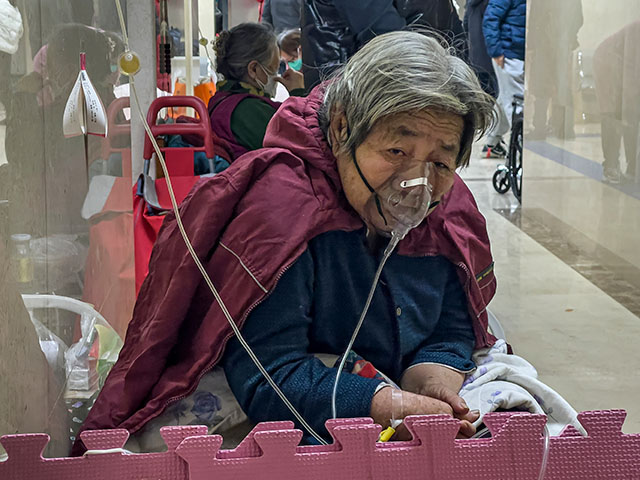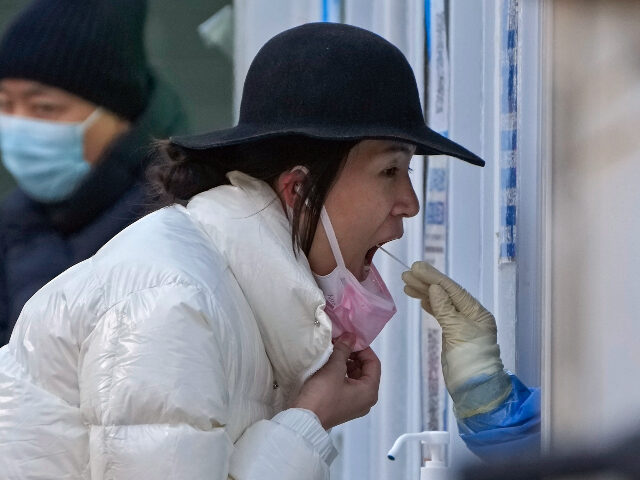China’s National People’s Congress (NPC), its rubber-stamp legislature, began work this week to amend the nation’s “Frontier Health and Quarantine Law” to include specific protocol on how to properly handle potential carriers of infectious disease.
According to the state-run Global Times newspaper, amendments to the law are part of a broader work docket for the “standing committee” of the NPC, which is comprised of the lawmakers that get together outside of the annual “two sessions” for all members of both the NPC and the weaker Chinese People’s Political Consultative Conference (CPPCC).
WATCH — Giroir: Biden Must Demand China Stop “Hiding” Sequence of 100% Lethal COVID, It’s Admission of Guilt with COVID-19:
China most recently amended the quarantine law in 2018, shortly before the onset of the Wuhan coronavirus pandemic, which evidence indicates originated in the central Chinese metropolis and spread globally after Chinese authorities allowed 5 million people to travel out of the city for the Lunar New Year – after health workers had documented the spread of a novel disease in the city.
The current updated draft of the border quarantine law, the Global Times explained, “improves measures of routinely preventing the cross-border transmission of infectious diseases, and strengthen the protection of business secrets and personal information involved in national health quarantine.”
“Under the draft, customs authorities are responsible to require inbound and outbound personnel to undergo temperature checks and medical inspections as general quarantine inspection measures,” the outlet added. Those whose temperatures or other factors indicate they may be carrying an infectious disease, the draft states, would be required to quarantine or potentially undergo other medical procedures.
Communist Party lawmakers introduced a second updated draft of the law on Tuesday. The new draft also calls for the Chinese government not to “infringe on the legitimate rights and interests” of implicated individuals. The Global Times did not explain what the repressive communist state would identify as a “legitimate” right, a point of necessary clarification after Beijing’s handling of the coronavirus pandemic, in which it imprisoned millions in their homes, for months in some cases, in sudden quarantines and disappeared suspected coronavirus patients into crowded, unsanitary quarantine camps.

An elderly patient receives an intravenous drip while using a ventilator in the hallway of the emergency ward in Beijing, January 5, 2023. (AP Photo/Andy Wong)
The Global Times nonetheless praised the new draft for offering a clear and uniform definition of “quarantine,” rather than giving more flexibility to local border officials to define what constitutes a proper quarantine.
The current law, last updated in 2018, requires the establishment of offices for health procedures at all “international seaports, airports and ports of entry at land frontiers and boundary rivers.”
“Persons, conveyances and transport equipment, as well as articles such as baggage, goods and postal parcels that may transmit quarantinable infectious diseases, shall undergo quarantine inspection upon entering or exiting the country,” the law requires.
The Frontier Health and Quarantine Law was one of several legal provisions at the disposition of Chinese officials when addressing the Wuhan coronavirus pandemic, leaving officials with an incoherent jumble of laws to follow, rather than one set of protocol. Wang Chenguang, a professor at dictator Xi Jinping’s alma mater Tsinghua University, wrote in May 2020 that the laws offered “a rather complete although imperfect legal framework for infectious diseases.”
WATCH — MTG: COVID Subcommittee to Question Fauci on Alleged Knowledge of Gain-of-Function Research in Wuhan:
Jack Knudsen / Breitbart NewsWang conceded that “a few local authorities” engaged in rampant human rights abuses in the early days of the outbreak in Wuhan, listing “shutting down roads and humiliating confirmed or suspected patients.” In reality, that treatment of citizens was pervasive and part of a larger framework that included hospitals reportedly turning down coronavirus patients to keep confirmed cases low, arresting doctors who warned colleagues to wash their hands and protect themselves from infectious disease, and allegedly welding people shut in their homes.
Abuses against residents were a significant challenge to China’s response to the pandemic but represented only one facet of the Communist Party’s poor handling of the situation. Most relevant to the Frontier Health and Quarantine Law is the fact that, despite reports suggesting that China identified its first case of Wuhan coronavirus as early as in November 2019, China did little to stop international outbound travel. Former Wuhan Mayor Zhou Xianwang – still active in politics as a member of the CPPCC – revealed in January 2020 that 5 million people out of a population of 11 million had traveled out of the city for Lunar New Year.
Flight traffic data from January 2020 reportedly indicates that China largely shut down domestic travel while millions of Chinese nationals traveled for Lunar New Year, apparently failing to similarly shut down international travel. On the contrary, Chinese officials regularly advocated against travel restrictions for Chinese citizens despite the spread of the disease.
The coronavirus pandemic officially concluded its run as a public health emergency of international concern in May 2023, when World Health Organization (W.H.O.) Director-General Tedros Adhanom Ghebreyesus lifted the emergency.
“Last week, [Wuhan coronavirus] claimed a life every three minutes – and that’s just the deaths we know about,” Tedros said in announcing the end of the public health emergency. At the time, the W.H.O. had documented nearly 7 million deaths attributable to the virus.
Follow Frances Martel on Facebook and Twitter.

COMMENTS
Please let us know if you're having issues with commenting.